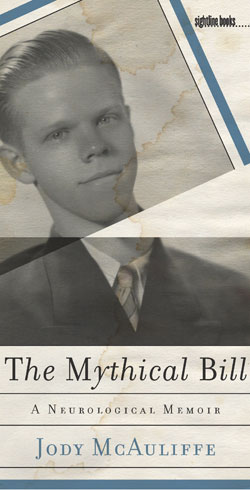
The brain takes center stage in Jody McAuliffe's new book "The Mythical Bill: A Neurological Memoir." Using family interviews, a personal diary and imagination, McAuliffe, chair of Duke’s theater studies department, attempts to comprehend her father's "falling apart" and untimely death.
After returning from World War II with torticollis, a persistent involuntary contraction of the neck muscles, McAuliffe’s father began suffering from a series of breakdowns, memory loss and aphasia, a communication disorder. By the time he died in 1975 at the age of 54, McAuliffe's father had exhibited signs of advanced dementia. Intrigued by her father's strange progression from torticollis to dementia, McAuliffe began researching his career in the military and early life to understand the causes and impact of her father's neurological illness.
In a recent conversation with Duke Today, McAuliffe discussed coming to terms with her father's illness and how she discovered that his "hidden life" was a central part of hers.
Q: What motivated you to share your father's story in this book?
A: From the time I was 10, my father began to have periods of confusion and eventually he had dementia. He would go in and out of lucidity. We didn't exactly know how he died or what he died of. His life was a mystery to me in many ways because he almost never talked about his time in the war or his interest in theater, but he left us a diary from one of his stints at a hospital psychiatric ward. That diary inspired me to think about using it in a book because I had become interested in telling stories through documentary materials. After my mother died in 2005, I turned to this diary and began to investigate if torticollis was related to the dementia that ensued many years later. Was this falling apart in any way related to the neurological disorder? That's why it's called a "neurological memoir," because it's really an unraveling of a neurological thread.
Q: Did you resent your father for his condition? Did writing this book give you any sort of closure?
A: Sometimes I was angry at him because I thought he was doing it on purpose. I was angry that he couldn't make it stop. I also think that in our society we're ashamed of dementia and mental illnesses in general. Now I feel like I have a much deeper grasp, without judgment, of my father's condition.
Q: After you conducted all this research and had all these documents together, how did you synthesize them into your book?
A: The whole process was really a journey toward discovering how my father was in me. I learned that my father studied playwriting as a graduate student at the University of Hawaii. He had never gone into theater as a profession but he loved it, and he hid that. I was never aware of the extent to which I had embodied my father's aspirations by going into theater.
Q: How does this work of literary nonfiction relate to your academic interests in drama?
A: To me, this book is theatrical. It has a lot of drive, its images are very vivid, the gestures are powerful. It's actually a lot about theater because it has to do with how my father's story influenced what plays I ended up directing. I gained a lot of perspective on my own life story from telling the story of my father. I always knew he was a hugely important person to me but I had no idea just how much his story played itself out in my life choices. There are many mysteries in the book.
Q: Would you say that most of the mysteries are solved by the end of the book?
A: There's a good bit of excavation here but there are some mysteries that can never be solved. I can never know what exactly happened to him in the war. It's amazing to me that when I wrote the book, I had so many questions that I never thought to ask when my father was alive. Still, I'm amazed by how much I got from my father subconsciously. This book is for people who have had ill parents or whose parents influenced their life choices. I hope it is as much a process of discovery for them as it was for me.
For more information on "The Mythical Bill," visit http://www.uiowapress.org/books/2013-spring/mythical-bill.htm.